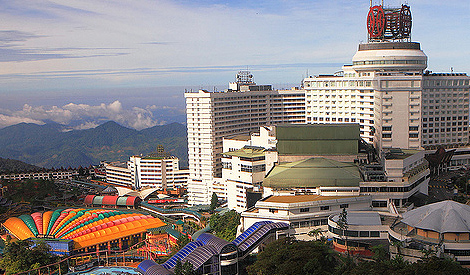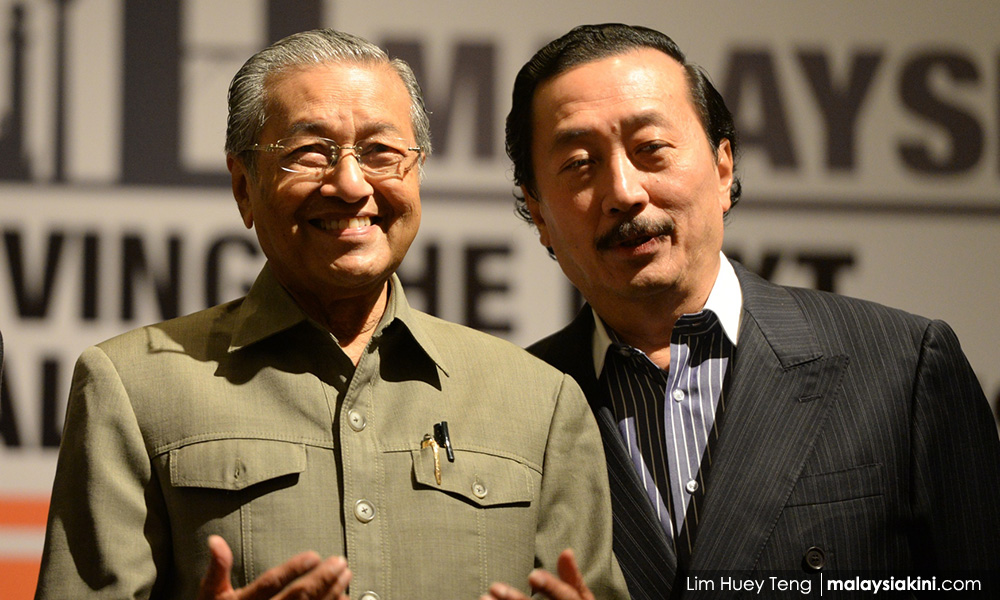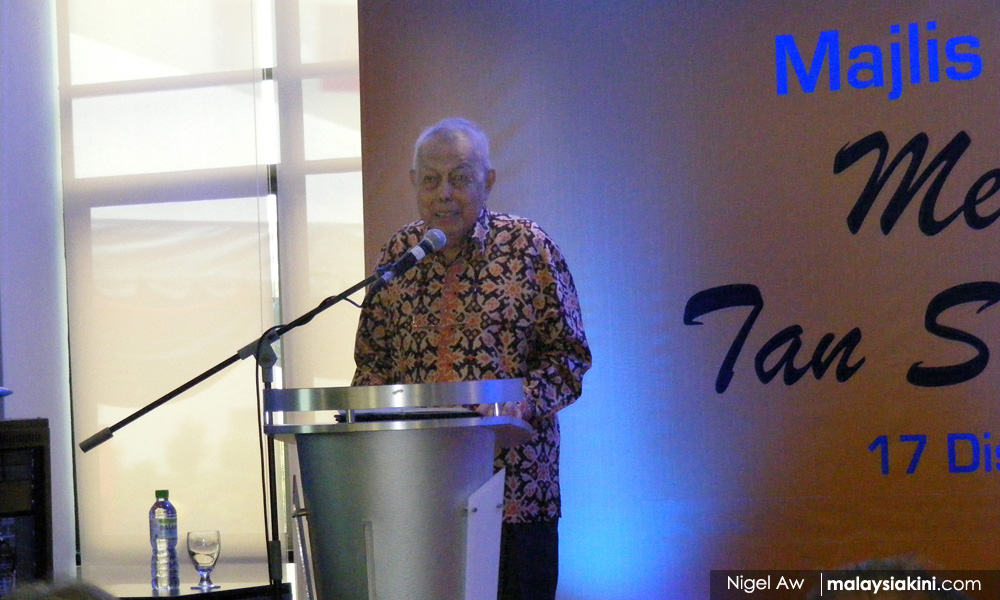Malaysiakini - Khazanah, Petronas and PNB proposed to be moved to PM's Dept (extracts):
In fact, it would not be far wrong to say that Mahathir oversaw the unprecedented transfer of wealth from government to the private sector with plum projects given to those closely associated with Mahathir and his finance minister then Daim Zainuddin, who is now ironically the head of the Council of Eminent Persons, as well as companies related to subsequent finance minister, Anwar Ibrahim.
Profits were ensured by ironclad power purchase agreements (PPAs) with the sole national power company, Tenaga Nasional Bhd (TNB) which had either “take or pay” contracts (YTL) and/or capacity charge payments where a fixed amount is paid based on fixed asset investment whether the energy is taken up or not.
Well, if you and I had got these contracts, we would have become billionaires too. None of those successful had previous power generation experience.
Wonder who he or she was?
There are proposals for key government-linked companies (GLCs) namely Khazanah Nasional, Petronas and Permodalan Nasional Bhd (PNB) to be moved to the Prime Minister's Department.
However, it is unclear how much oversight Prime Minister Dr Mahathir Mohamad will have over these GLCs that were previously under the Minister of Finance (MoF) Inc.
A list sighted by Malaysiakini stated that the GLCs will be placed under the Prime Minister's Department, meaning that ministers in that department could oversee the firms.
However, The Star reported today the three will be placed under the Prime Minister's Office, which is directly under Mahathir.
However, it is unclear how much oversight Prime Minister Dr Mahathir Mohamad will have over these GLCs that were previously under the Minister of Finance (MoF) Inc.
A list sighted by Malaysiakini stated that the GLCs will be placed under the Prime Minister's Department, meaning that ministers in that department could oversee the firms.
However, The Star reported today the three will be placed under the Prime Minister's Office, which is directly under Mahathir.
Wakakaka.
One - the 3 GLCs which were previously under the Ministry of Finance will now be moved to under the PM's Department.
Why the PM's Department?
Doesn't this huge slice of the financial portfolio make Guan Eng a Lil' Boy Blue instead of the Finance Minister?
Doesn't this renege on the Pakatan manifesto pledge that the PM won't take on another ministry which Mahathir effectively has vis-a-vis the Finance Ministry? Thus Mahathir becomes the real Finance Minister and Guan Eng his bookkeeper.
Have you read my yesterday's post Khazanah the Mahathir way to making billionaires the main part of which was written by Malaysiakini's columnist P Gunasegaram?
Yesterday, Malaysiakini also published:
Yesterday, in his maiden speech in the Dewan Rakyat as part of the opposition, Najib had accused the Pakatan Harapan government of adopting "regressive policies".
Among the examples he cited were the decrease in civil servants' salaries, another proposed national car project instead of a focus on public transportation and increased government subsidies.
He claimed these were policies the PKR reformasi movement had been against in the past.
Among the examples he cited were the decrease in civil servants' salaries, another proposed national car project instead of a focus on public transportation and increased government subsidies.
He claimed these were policies the PKR reformasi movement had been against in the past.
Mahathir retorted by asking whether we ought to return to the era of kleptocracy?
We most definitely shouldn't, NOR should we return to the era of cronyism, nepotism and pilfer-cracy.
Now, a re-iteration of what P Gunasegaram wrote of the era of cronyism, nepotism and pilfer-cracy (extracts):
In fact, it would not be far wrong to say that Mahathir oversaw the unprecedented transfer of wealth from government to the private sector with plum projects given to those closely associated with Mahathir and his finance minister then Daim Zainuddin, who is now ironically the head of the Council of Eminent Persons, as well as companies related to subsequent finance minister, Anwar Ibrahim.
This period saw the blossoming of the first generation independent power producers - or IPPs - with awards for massive power generation contracts to the YTL group (Francis Yeoh), Segari (MRCB, and subsequently Syed Mokhtar Albukhary, a close Mahathir associate to this day, under Malakoff), Genting Sanyen (the Genting casino group) and to PD Power (Ananda Krishnan) amongst others.
 |
Well, if you and I had got these contracts, we would have become billionaires too. None of those successful had previous power generation experience.
 |
Not just IPPs but a whole slew of privatisation and related arrangements came up. Toll roads were pioneered via Halim Saad’s Plus Expressway in the mid-80s, a known crony of Daim who had many other cronies. Another, Tajudin Ramli, bought over cellular operations, now Celcom, from Telekom Malaysia and was given a period to get it up and going before others were allowed in.
The Sapura group, owned by Mahathir’s close friend Shamsuddin Abdul Kadir, got a cellular licence as well as Ananda Krishnan, tycoon Vincent Tan (right in photo) and the MRCB group associated with Anwar.
Other instances of awards included to Malaysia Mining Corp (Syed Mokhtar), Gamuda (Lin Yun Ling), Samsuddin Abu Hassan (a Daim crony) of Peremba and Wan Azmi Wan Hamzah (a close Daim associate). Apart from IPPs and telecommunications, other lucrative areas included water and numerous state and federal operations.
In almost all cases, there were no open bids and many of these licences were awarded for free with no payment whatsoever to the government. The government was basically giving away assets. In many cases, the awards of these contracts were blatantly and highly questionable.
Ani Arope's tale of woe
Former TNB chairperson the late Ani Arope (known also as the man who refused Mahathir) had a tale of woe to tell regarding the award of power purchase agreements to the first generation IPPs.
The Sapura group, owned by Mahathir’s close friend Shamsuddin Abdul Kadir, got a cellular licence as well as Ananda Krishnan, tycoon Vincent Tan (right in photo) and the MRCB group associated with Anwar.
 |
In almost all cases, there were no open bids and many of these licences were awarded for free with no payment whatsoever to the government. The government was basically giving away assets. In many cases, the awards of these contracts were blatantly and highly questionable.
Ani Arope's tale of woe
Former TNB chairperson the late Ani Arope (known also as the man who refused Mahathir) had a tale of woe to tell regarding the award of power purchase agreements to the first generation IPPs.
He talks of delays to TNB projects which caused a massive blackout in 1992, lopsided contracts which gave sweetheart deals to privileged people at the expense of TNB and 30 percent bumiputera stakes to companies and individuals who were not clearly identified.
In an interview with The Star in 2006, after Mahathir had stepped down as prime minister in 2003, he described how TNB got a rather raw deal and he was asked to resign after he refused to sign the PPAs.
He said, “There was no negotiation. Absolutely none. Instead of talking directly with the IPPs, TNB was sitting down with the EPU. And we were harassed, humiliated and talked down every time we went there. After that, my team was disappointed. The EPU just gave us the terms and asked us to agree. I said no way I would.
“It was all fixed up. (They said) this is the price, this is the capacity charge and this is the number of years. They said you just take it and I refused to sign the contracts. And then, I was put out to pasture.
“It was all fixed up. (They said) this is the price, this is the capacity charge and this is the number of years. They said you just take it and I refused to sign the contracts. And then, I was put out to pasture.
“It was grossly unfair. At 16 sen per unit (kWh) and with the take or pay situation, actually it was 23 sen per unit. With 23 sen, plus transmission and distribution costs, TNB would have had to charge the consumer no less than 30 sen per unit. If mixed with TNB’s cost, the cost would come down but that was at our expense because we were producing electricity at 8 sen a unit. We can deliver electricity at 17 sen per unit.”
Why was this done? In a 2014 interview with KiniBiz, six months before his death, Ani (photo) had this to say: “The crux of the whole thing was who got the 30 percent. The first PPA with YTL, there was a 30 percent shares (requirement) for the bumiputera. That explains the whole thing.” Subsequent PPAs also had this same clause.
 |
Why was this done? In a 2014 interview with KiniBiz, six months before his death, Ani (photo) had this to say: “The crux of the whole thing was who got the 30 percent. The first PPA with YTL, there was a 30 percent shares (requirement) for the bumiputera. That explains the whole thing.” Subsequent PPAs also had this same clause.
Kaytee note: I read above, especially the part by Ani Arope, as that the recipient of the 30% bumiputera allocation was NOT identified.
And today we are going to put Khazanah, PNB and Petronas under Maddy?
Wasn't it George Santayana who advised us: "Those who do not remember the past are condemned to repeat it."
And Guan Eng, supposedly the Finance Minister has absolutely NO control over these BIG three?















No comments:
Post a Comment
Note: Only a member of this blog may post a comment.